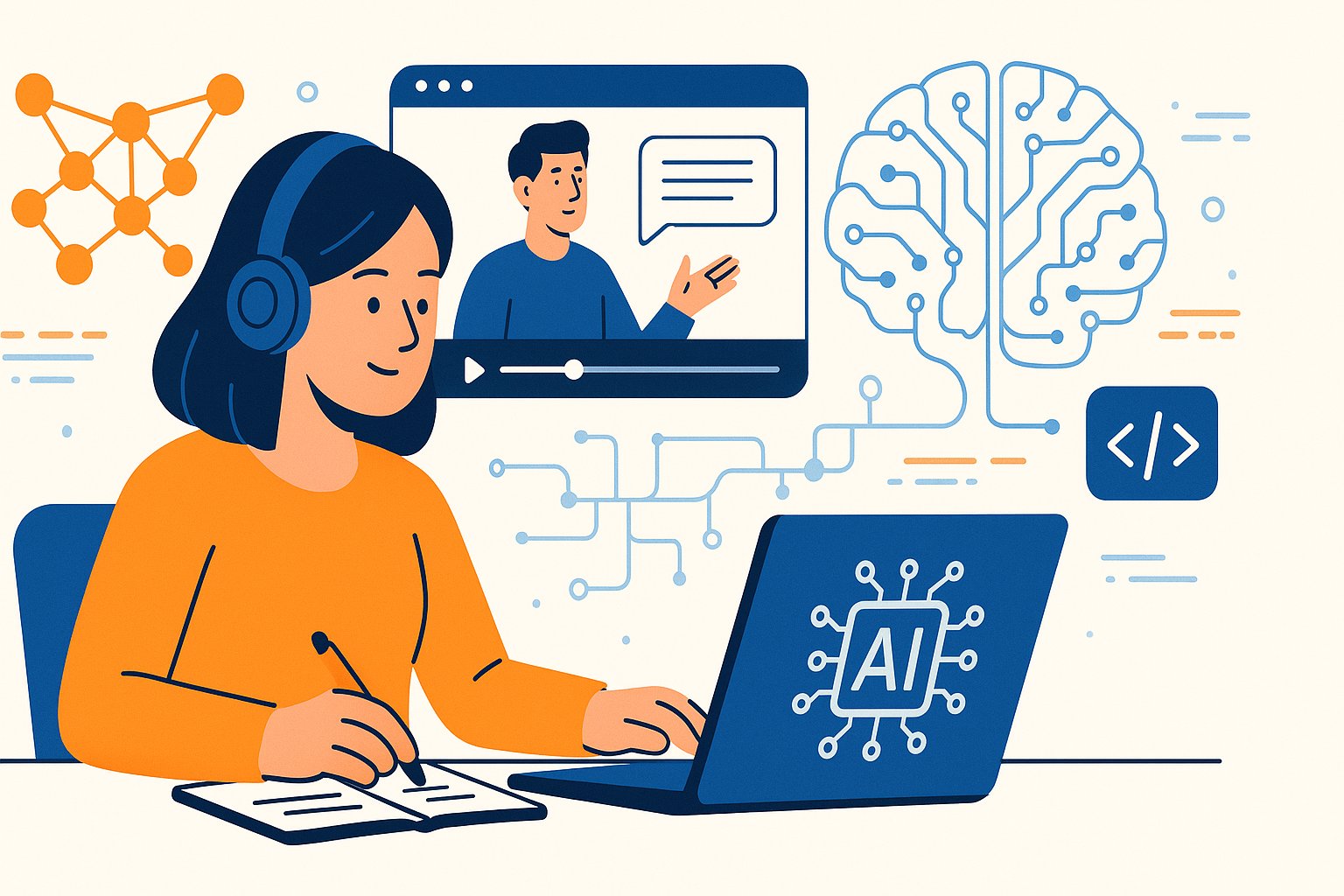15 Recommended AI Courses for Research and Development Engineers in 2025
Discover cutting-edge AI courses tailored for research and development engineers. Enhance your skills with the latest tools and methodologies to keep pace with 2025's evolving tech landscape. Perfect for boosting innovation and career growth!

The landscape of technology is undergoing a profound transformation, with Artificial Intelligence (AI) at the forefront of this change. As businesses and industries embrace AI, the demand for professionals skilled in AI technologies continues to surge. For Research and Development Engineers, this shift presents both a challenge and an opportunity. The necessity to upskill and integrate AI into existing competencies is becoming increasingly urgent. This is not just about staying relevant; it’s about ensuring that professionals can contribute effectively to their organizations and advance in their careers. The potential job impacts of AI are significant, with roles evolving to incorporate more AI-driven tasks and responsibilities.
Why AI matters for Research and Development Engineers today
AI has become an essential component in the toolkit of Research and Development Engineers. Its importance is underscored by the fact that 69% of businesses are already utilizing AI in some capacity, reflecting a trend that shows no signs of slowing down. For engineers focused on research and development, AI offers tools that streamline processes, improve accuracy, and enhance innovation. This article aims to assist Research and Development Engineers in identifying the best AI courses available, ensuring they are well-equipped to meet the demands of their evolving roles and take advantage of new opportunities in the field.
The Growing Role of AI in Research and Development Engineers
AI applications are increasingly prevalent in the field of research and development. From automating repetitive tasks to enhancing decision-making processes and personalizing solutions, AI is reshaping how engineers work. It allows for the analysis of vast data sets with greater speed and precision, leading to more informed decisions and innovative product development. By integrating AI into workflows, Research and Development Engineers can achieve greater efficiency, reduce time to market for new products, and drive competitive advantage for their organizations.
Benefits of becoming an AI expert in Research and Development Engineers
For Research and Development Engineers, becoming proficient in AI technologies offers numerous benefits. It not only expands their skill set but also increases their value to employers who are increasingly seeking candidates with AI expertise. This proficiency can lead to career advancement opportunities, higher salaries, and a stronger professional reputation. Moreover, AI expertise enables engineers to lead projects that are at the cutting edge of technology, fostering innovation and contributing to the strategic goals of their organizations.
This article will compare 15 AI courses tailored for Research and Development Engineers, including options such as CompleteAI Training, which offers a comprehensive library of video courses and certifications. These courses are designed to provide professionals with the skills necessary to thrive in an AI-driven world, ensuring they remain at the forefront of their field.

Comparison: All AI Courses for Research and Development Engineers (Updated Q2' 2025)
| Course Name | Provider | Price | Key Topics | Pros | Cons | Best For |
|---|---|---|---|---|---|---|
| CompleteAI Training for Research and Development Engineers | Complete AI Training | $29/month (monthly), $8.25/month billed annually | Specialized video courses, certifications, AI tools, industry news | Highest rating, extensive range, daily updates, affordable pricing | Subscription based, continuous learning needed | Research and Development Engineers professionals |
| IBM AI Developer Professional Certificate | IBM via Coursera | $39-$79/month | AI development, prompt engineering, large language modeling, Python | Comprehensive coverage, hands-on skills, recognized certificate | 3-6 months commitment, prior programming knowledge beneficial | General learners |
| IBM AI Engineering Professional Certificate | IBM via Coursera | $39-$79/month | Advanced AI engineering, PyTorch, Keras, TensorFlow | Covers advanced topics, practical learning, recognized certification | Intermediate level, requires prior experience | General learners |
| Fundamentals of Machine Learning and Artificial Intelligence | Amazon Web Services (AWS) via Coursera | Free to audit, $49-$79 for certificate | Generative AI, deep learning, AWS tools | Free audit, practical AWS tools, good foundational knowledge | Less depth on engineering implementation | General learners |
| Machine Learning Specialization | DeepLearning.AI via Coursera | $39-$79/month | Supervised learning, neural networks, Python libraries | High-quality instruction, broad coverage, practical exercises | Requires programming and math background | General learners |
| Introduction to Artificial Intelligence (AI) | IBM via Coursera | Free to audit, $49-$79 for certificate | Generative AI, ChatGPT, NLP | Beginner-friendly, covers current trends, free audit | Less technical depth | General learners |
| Artificial Intelligence Nanodegree Program | Udacity | $148.50/month or $504.90 for 4-month bundle | Optimization algorithms, Bayesian networks, Python projects | Industry expert instructors, hands-on projects, career services | Requires prior Python knowledge | General learners |
| Deep Learning Specialization | DeepLearning.AI via Coursera | $49.99/month | Neural networks, CNNs, deep learning applications | Taught by Andrew Ng, covers key AI subfields, practical focus | Requires prior knowledge of Python and ML basics | General learners |
| LangChain - Develop LLM Powered Applications with LangChain | Udemy | $12.99 (may vary) | Large language models, prompt engineering, Python projects | Affordable, regularly updated, practical development focus | Requires Python experience | General learners |
| Large Language Models Professional Certificate | Databricks via edX | $198 (free to audit) | LLM theory, applications, Python labs | In-depth coverage, practical labs, expert instructors | Requires prior ML knowledge | General learners |
Understanding AI Training for Research and Development Engineers Professionals
Artificial Intelligence (AI) is increasingly becoming a vital component in the toolkit of Research and Development (R&D) Engineers. With the rapid advancements in AI technologies, there is a growing need for specialized training programs designed to equip R&D professionals with the skills required to implement AI solutions effectively. This article provides a comprehensive comparison of various AI courses tailored for R&D Engineers, focusing on the unique offerings and benefits of each program.
Course 1: CompleteAI Training
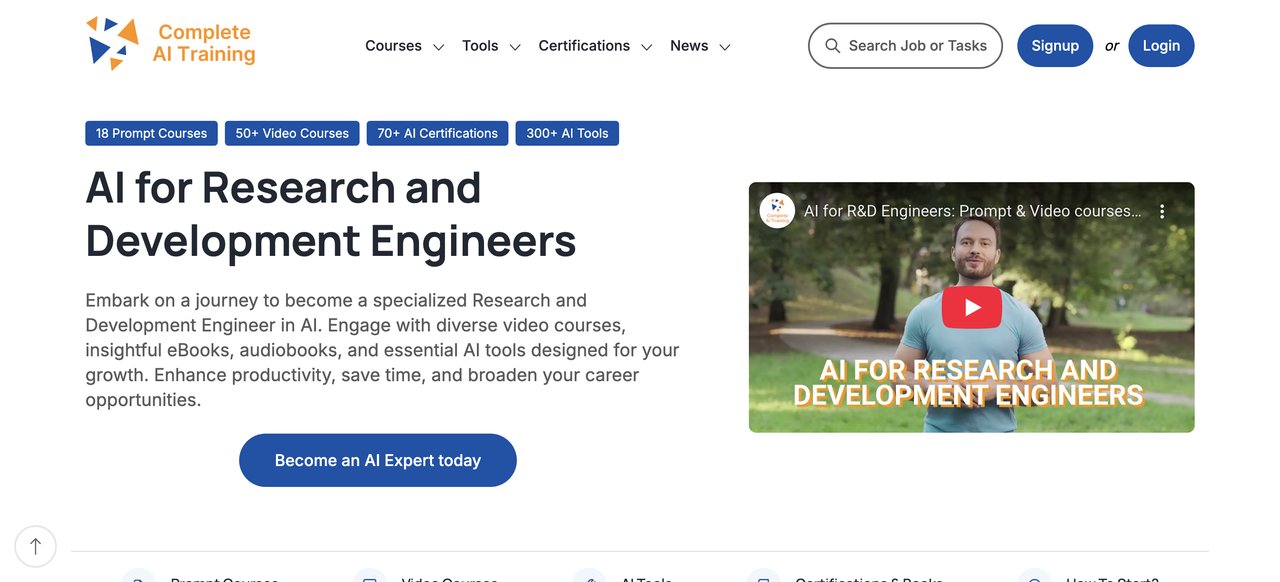
Complete AI Training offers a comprehensive suite of over 100 specialized video courses and certifications specifically designed for Research and Development Engineers. This program provides a deep dive into AI education, supplemented by daily updates on the latest AI tools and industry news relevant to R&D professionals.
The course covers a wide range of topics, ensuring a thorough understanding of AI concepts and applications. It is accessible to engineers at all experience levels, with flexible subscription plans that make it affordable.
- Pros:
- Extensive range of AI courses and certifications tailored for R&D Engineers
- Daily updates on relevant AI tools and news
- Affordable pricing, especially with annual billing
- Highest rating for comprehensive offering
- Cons:
- Subscription-based model requires continuous enrollment
This course is ideal for R&D Engineers looking for an all-encompassing AI training program that keeps them updated with the latest developments in the field. Learn more about CompleteAI Training
Course 2: IBM AI Developer Professional Certificate
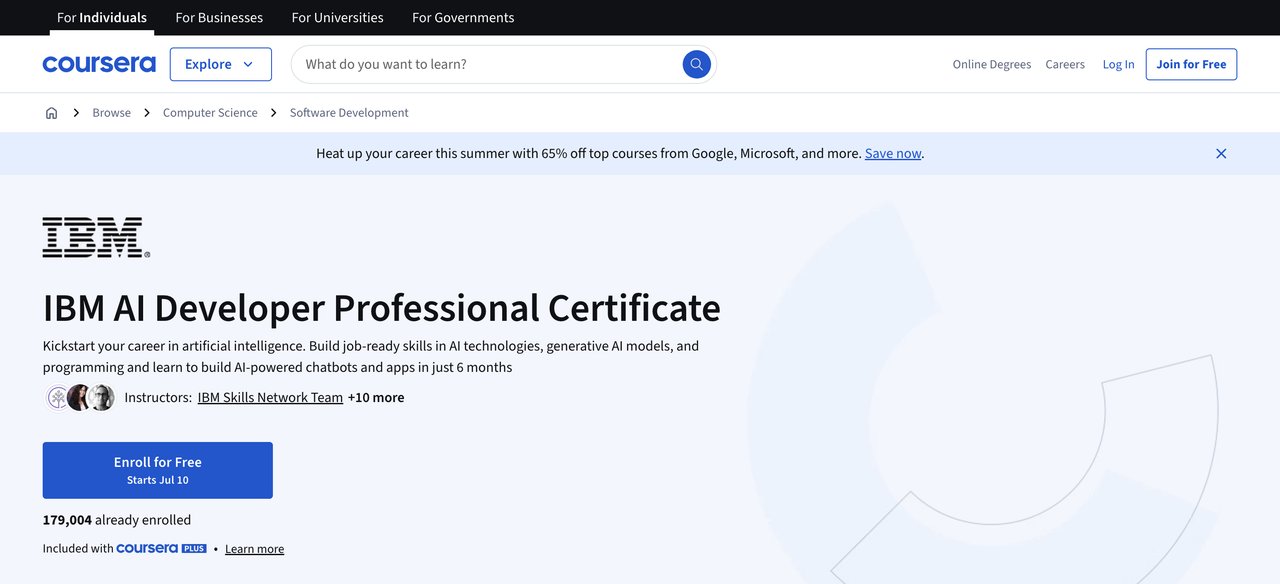
Offered by IBM via Coursera, this professional certificate is designed for beginners aiming to build skills in AI development. The course covers a comprehensive range of topics, including prompt engineering, large language modeling, and Python programming, making it highly suitable for R&D engineers involved in software projects.
- Pros:
- Comprehensive coverage of AI development and software engineering
- Hands-on skills with popular frameworks and tools
- Builds towards a recognized professional certificate
- Cons:
- Requires a 3-6 months commitment
- Some prior programming knowledge beneficial
This course is best suited for R&D Engineers who are new to AI but have some programming background and are looking to develop AI solutions in software projects. Learn more about IBM AI Developer Professional Certificate
Course 3: IBM AI Engineering Professional Certificate
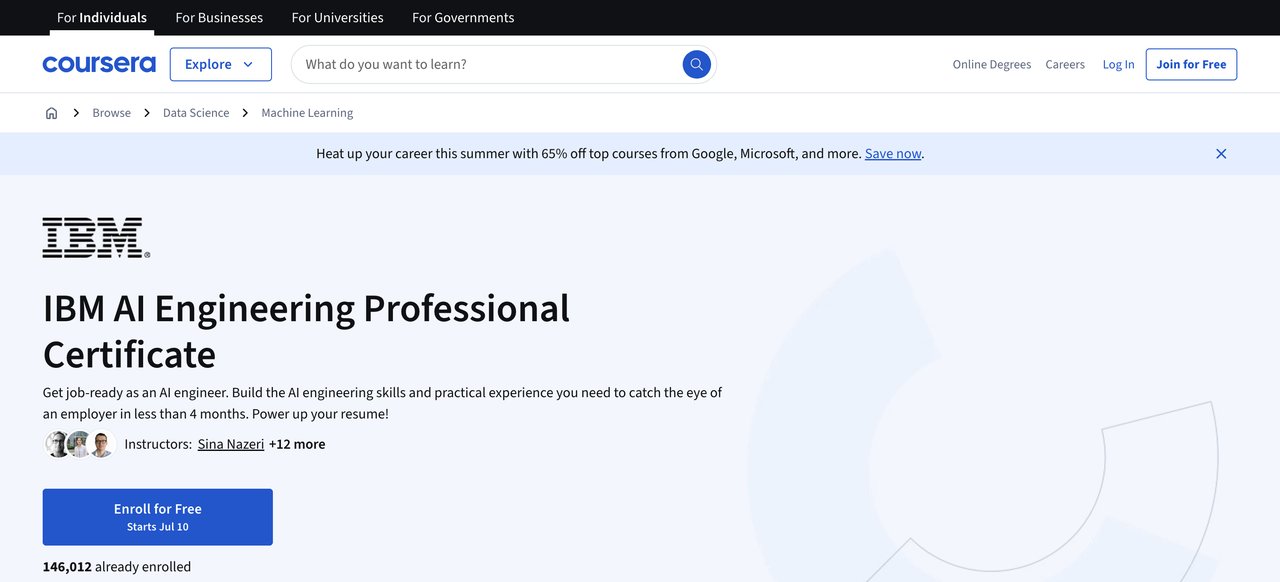
This intermediate-level course focuses on advanced AI engineering skills and is ideal for R&D engineers looking to deepen their expertise. The curriculum includes topics such as reinforcement learning, deep learning, and applied machine learning, providing a practical and applied learning experience.
- Pros:
- Covers advanced AI engineering topics and frameworks
- Practical and applied learning
- Recognized professional certification
- Cons:
- Intermediate level requires some prior AI or programming experience
- 3-6 months duration
This course is most beneficial for R&D Engineers who already have a basic understanding of AI and want to advance their skills in AI engineering. Learn more about IBM AI Engineering Professional Certificate
Course 4: Fundamentals of Machine Learning and Artificial Intelligence by AWS

This course provides foundational knowledge in AI and machine learning, focusing on cloud-based AI services using AWS tools. It's suitable for engineers starting to explore AI and ML, offering practical experience with AWS SageMaker and other tools.
- Pros:
- Free audit option
- Practical AWS cloud AI tools
- Good for foundational knowledge
- Cons:
- Less depth on engineering implementation compared to IBM certificates
Ideal for R&D Engineers who are new to AI and want to understand the basics of machine learning with a focus on cloud services. Learn more about AWS Machine Learning and AI
Course 5: Machine Learning Specialization by DeepLearning.AI
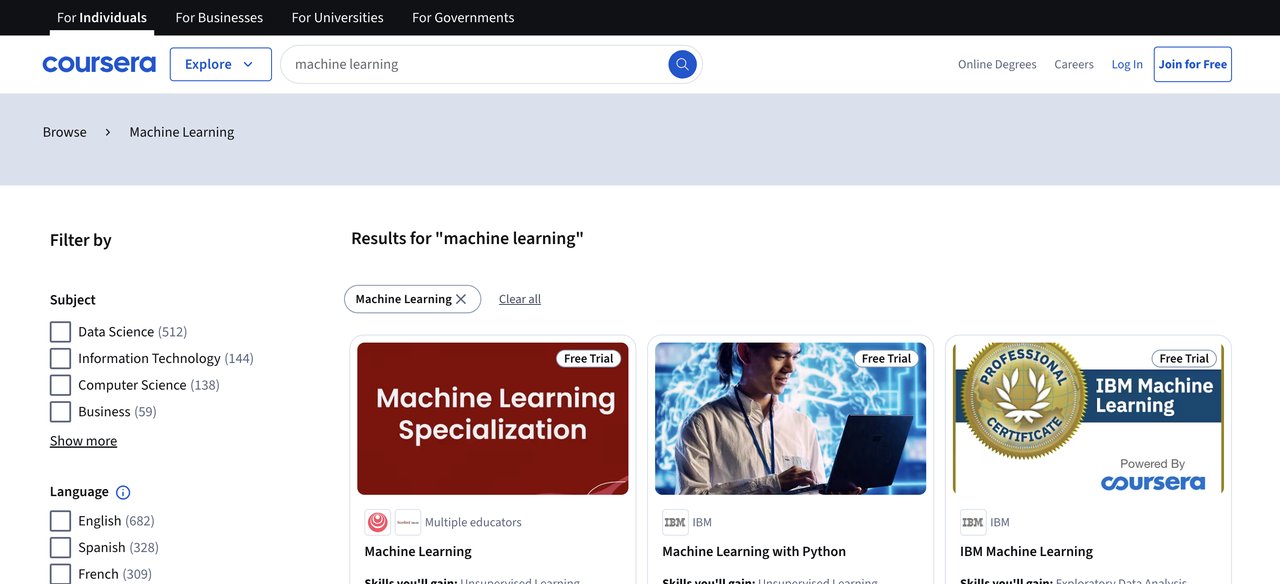
This specialization covers core machine learning concepts including neural networks and reinforcement learning. It provides practical implementation experience with Python libraries, making it suitable for R&D engineers building strong ML foundations.
- Pros:
- High-quality instruction from DeepLearning.AI
- Broad coverage of ML algorithms
- Practical coding exercises
- Cons:
- Requires some programming and math background
- Multiple courses in specialization
Best for R&D Engineers who want to establish a solid foundation in machine learning with practical coding applications. Learn more about Machine Learning Specialization
Course 6: Introduction to Artificial Intelligence (AI) by IBM

This beginner-level course introduces AI concepts such as generative AI and NLP. It is well-suited for engineers new to AI who seek a broad overview before engaging in more technical development projects.
- Pros:
- Beginner-friendly
- Covers current AI trends
- Free audit option
- Cons:
- Less technical depth for R&D engineering roles
Ideal for engineers new to AI looking for a comprehensive introduction to the field. Learn more about IBM Introduction to AI
Course 7: Artificial Intelligence Nanodegree Program by Udacity
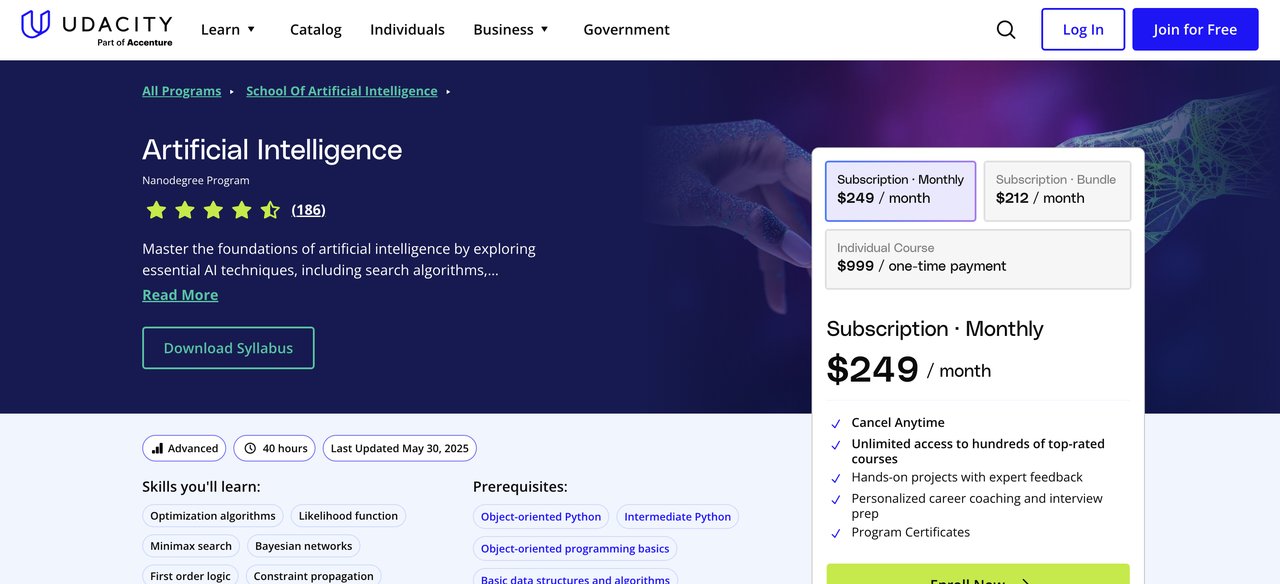
This comprehensive program covers foundational AI concepts and includes hands-on projects. It is designed for those with Python knowledge, focusing on applying AI theories to real-world scenarios.
- Pros:
- Industry expert instructors
- Hands-on projects applying theory to real-world scenarios
- Career services and project reviews included
- Cons:
- Requires prior Python knowledge
Best for R&D Engineers with a background in Python who want to develop practical AI applications. Learn more about AI Nanodegree
Course 8: Deep Learning Specialization by DeepLearning.AI
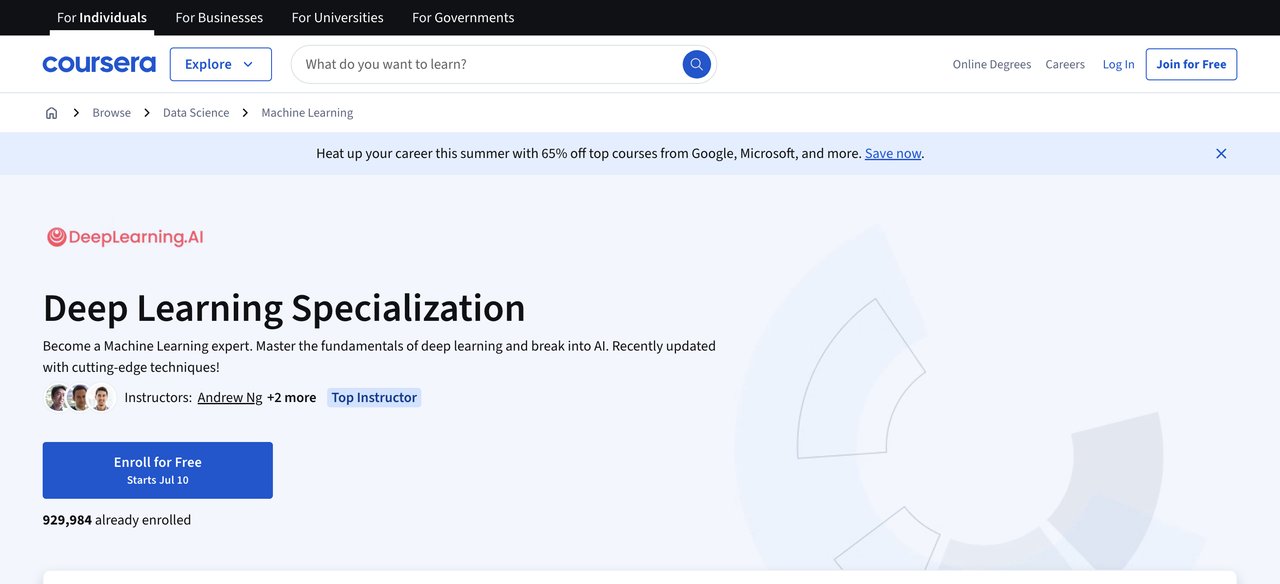
This in-depth specialization focuses on neural networks and deep learning applications in computer vision and NLP. It includes practical projects for hands-on learning, making it ideal for those with prior AI knowledge.
- Pros:
- Taught by Andrew Ng and Stanford instructors
- Covers key AI subfields like CV and NLP
- Strong practical focus with coding exercises
- Cons:
- Requires prior knowledge of Python, linear algebra, and ML basics
Perfect for R&D Engineers who want to specialize in deep learning and have a prior understanding of AI fundamentals. Learn more about Deep Learning Specialization
Course 9: LangChain - Develop LLM Powered Applications with LangChain by Udemy
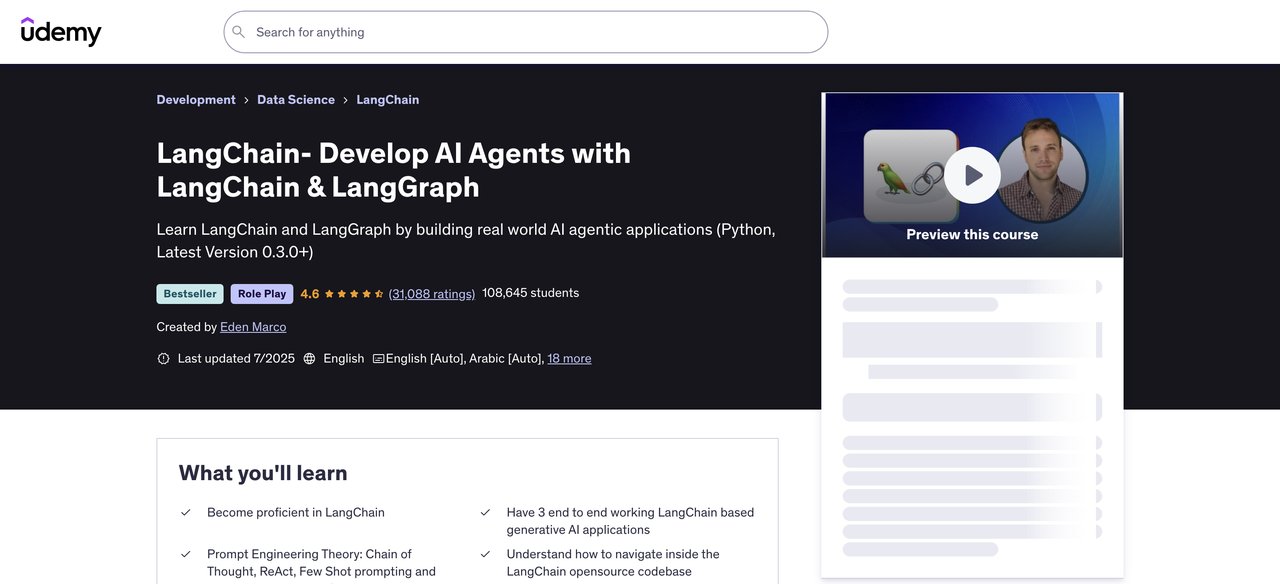
This course focuses on building large language model applications using LangChain, ideal for Python-experienced software engineers. It offers practical projects and is regularly updated to stay relevant.
- Pros:
- Affordable and practical
- Regularly updated content
- Focus on cutting-edge LLM application development
- Cons:
- Requires Python experience
- Shorter course duration (9.5 hours)
Suitable for R&D Engineers with Python experience looking to develop advanced language model applications. Learn more about LangChain
Course 10: Large Language Models Professional Certificate by Databricks via edX
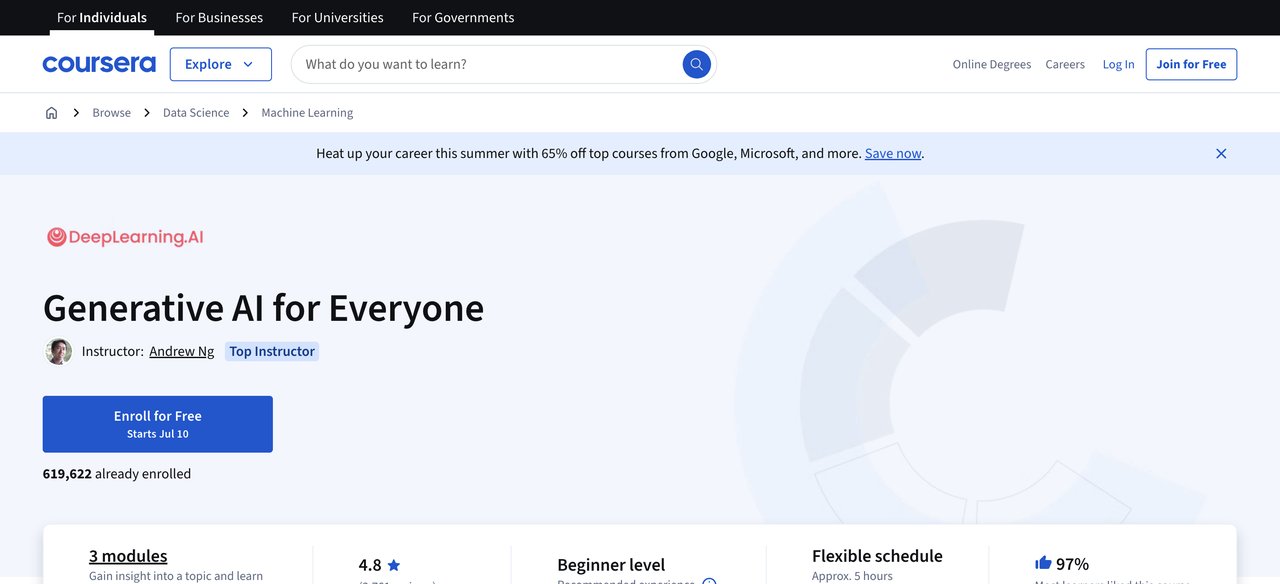
This course provides an in-depth exploration of large language models, including practical coding labs with Python and PyTorch. It is designed for those with prior machine learning knowledge.
- Pros:
- In-depth coverage of LLM internals and applications
- Practical coding labs
- Taught by experts with PhDs from MIT and CMU
- Cons:
- Requires prior machine learning knowledge
- Short duration may limit depth for some topics
Ideal for R&D Engineers with a strong background in machine learning seeking to specialize in large language models. Learn more about Large Language Models Certificate
Course 11: CS50’s Introduction to Artificial Intelligence with Python by Harvard University
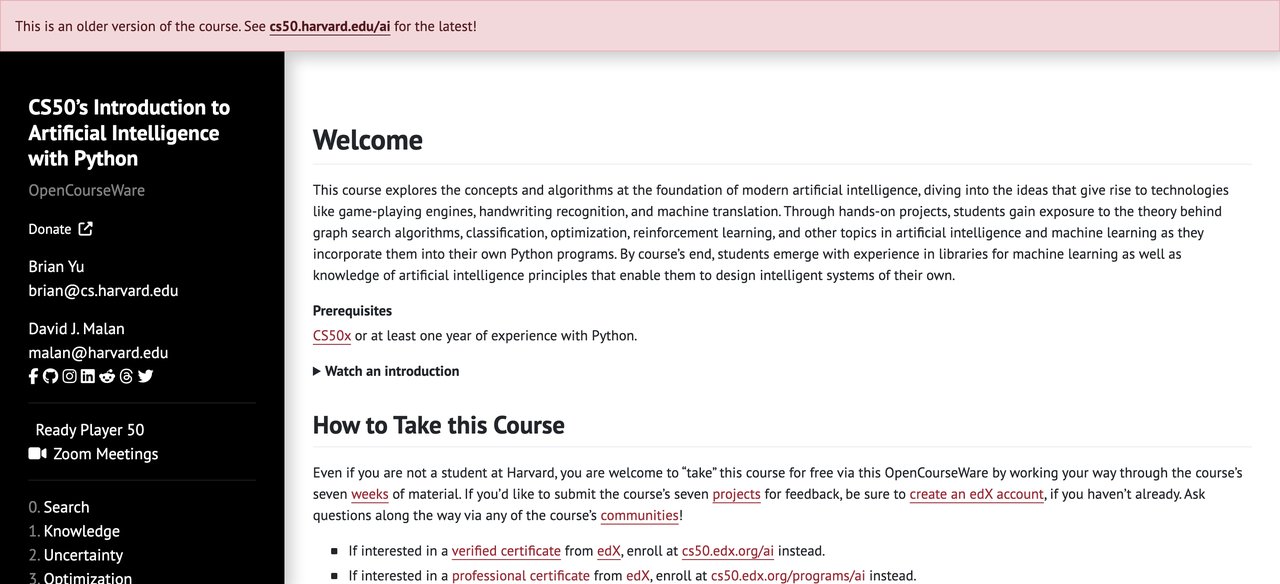
This intermediate course teaches AI and ML fundamentals using Python. It includes hands-on projects such as game-playing engines and handwriting recognition, making it suitable for those with Python knowledge.
- Pros:
- Taught by Harvard professors
- Strong practical coding focus
- Free auditing option
- Cons:
- Time-intensive
- Certificate is relatively costly
Best for R&D Engineers with Python skills looking for an intensive AI course taught by prestigious instructors. Learn more about CS50 AI with Python
Course 12: Computer Science for Artificial Intelligence Professional Certificate by Harvard University via edX
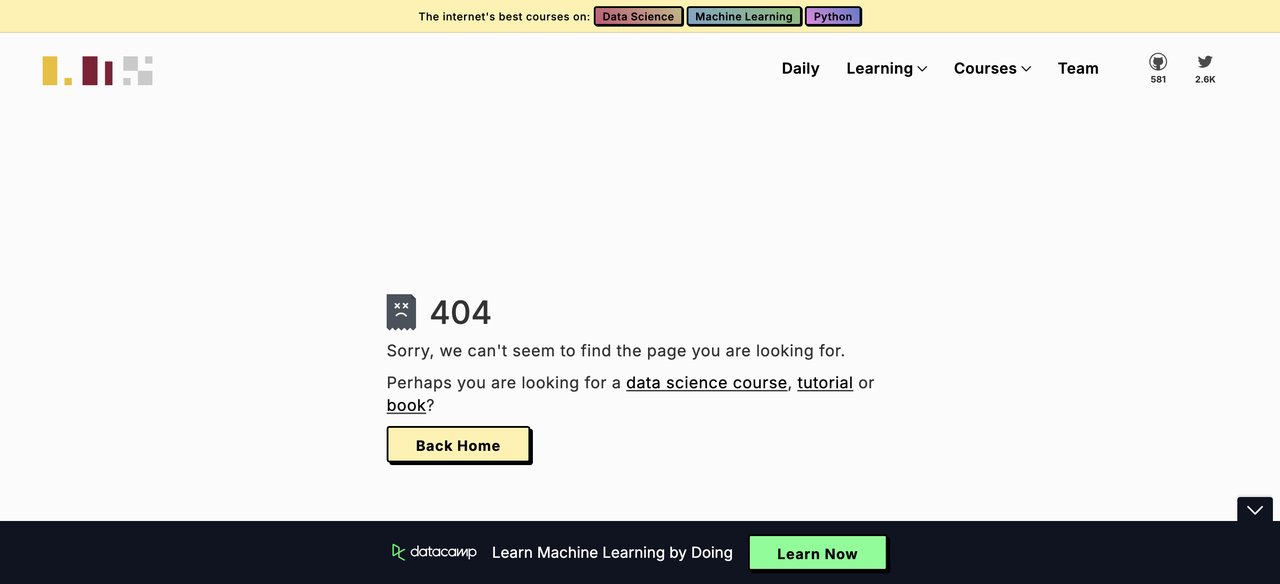
This professional certificate program covers computer science fundamentals and AI concepts, including programming in C and Python. It offers a rigorous, college-level curriculum suitable for committed learners.
- Pros:
- Rigorous, college-level curriculum
- Strong community and instructor support
- Covers both CS and AI fundamentals
- Cons:
- Demanding for beginners without coding background
- Requires commitment to complete
Ideal for R&D Engineers committed to mastering the fundamentals of computer science and AI. Learn more about CS for AI Certificate
Course 13: Artificial Intelligence (MIT OpenCourseWare)
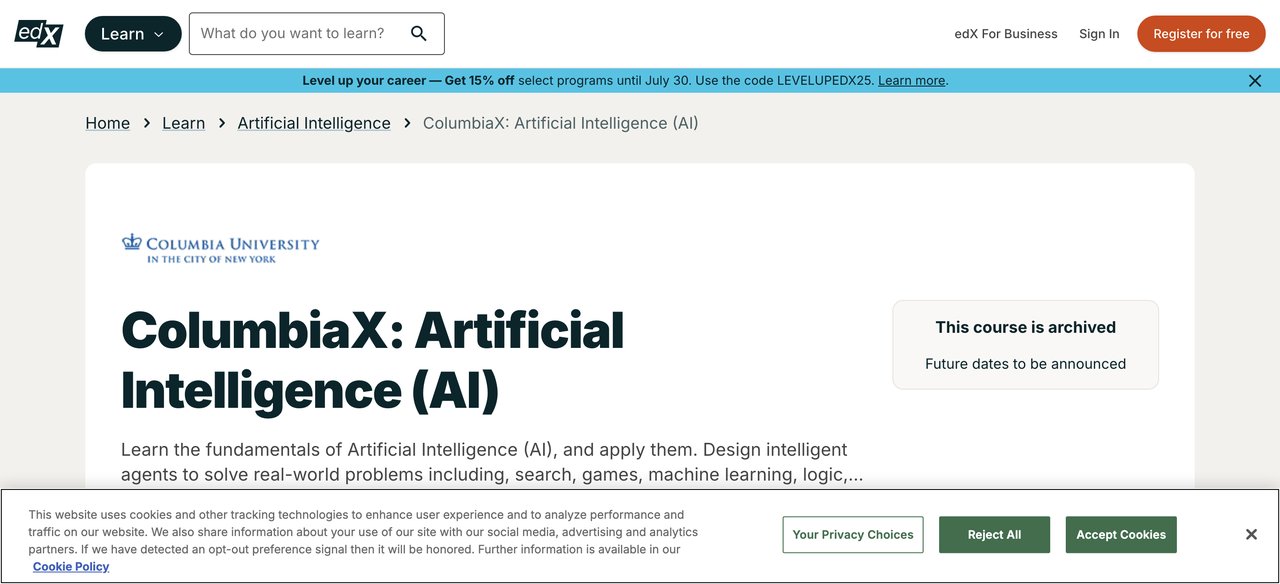
This free, self-paced undergraduate AI course covers classic AI algorithms and machine learning basics. It offers extensive resources but requires self-motivation and self-grading.
- Pros:
- Free access to MIT-level content
- Covers broad AI topics including neural networks
- Taught by renowned professor Patrick Winston
- Cons:
- No interactive platform or grading support
- Requires discipline and prior Python knowledge
Suitable for self-motivated R&D Engineers seeking foundational AI knowledge with access to high-quality resources. Learn more about MIT AI Course
Course 14: CS224N: Natural Language Processing with Deep Learning by Stanford University
This advanced course on NLP and deep learning includes free lectures available online. It covers transformers, specialized NLP applications, and requires high-level prerequisites.
- Pros:
- World-class Stanford instruction by Prof. Christopher Manning
- Deep dive into NLP and transformer models
- Free lecture access
- Cons:
- High cost for certificate and graded content
- Demanding prerequisites
Best for advanced R&D Engineers specializing in NLP and deep learning. Learn more about Stanford NLP Course
Course 15: Self-Driving Cars with Duckietown by ETH Zurich via edX
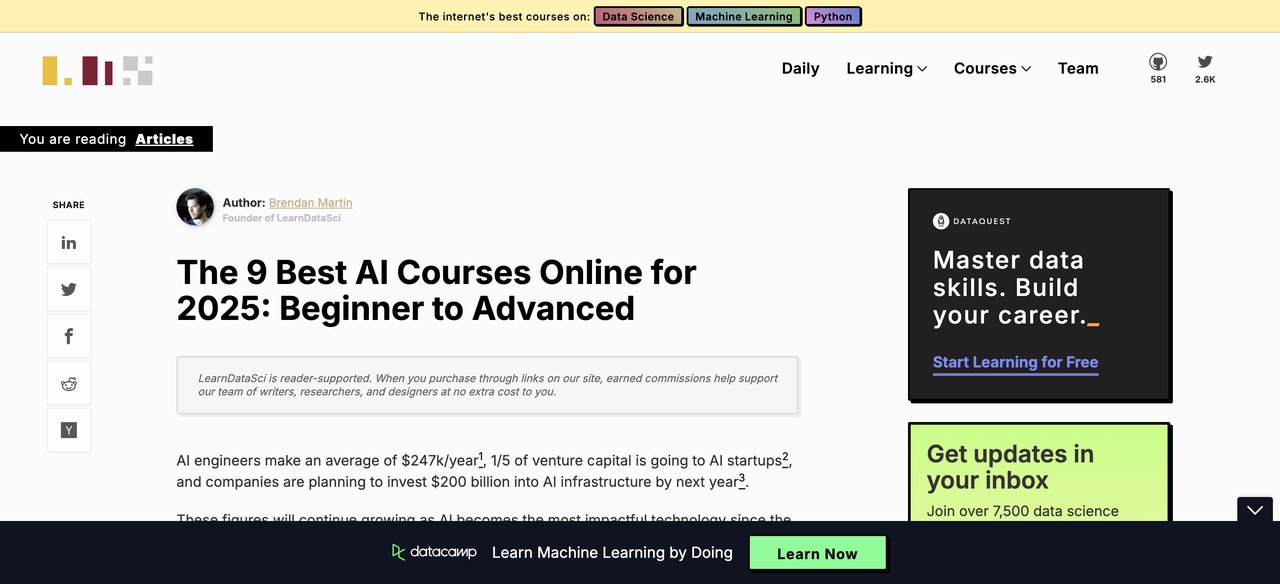
This hands-on robotics course involves programming a physical self-driving robot. It covers autonomous driving fundamentals and requires advanced prerequisites, including Python and Linux knowledge.
- Pros:
- Unique physical robot kit for real-world experience
- Covers robotics, IoT, and reinforcement learning
- Taught by a team of top researchers
- Cons:
- Advanced prerequisites
- Additional cost for physical materials
Ideal for R&D Engineers interested in robotics and autonomous driving systems. Learn more about Self-Driving Cars with Duckietown
Overall Recommendations for R&D Engineers
Choosing the right AI course depends on your current skill level, professional goals, and the specific AI applications you wish to explore. For those seeking a comprehensive and continuously updated resource, CompleteAI Training is an excellent option due to its extensive library and affordable pricing.
For beginners, courses like IBM's Introduction to AI or AWS's Fundamentals of Machine Learning and AI offer a solid start. Intermediate to advanced learners might benefit more from specialized programs like the Machine Learning Specialization by DeepLearning.AI or Stanford's CS224N: Natural Language Processing.
For practical, hands-on experience, consider Udacity's AI Nanodegree or ETH Zurich's Self-Driving Cars with Duckietown. Ultimately, the best course will align with your specific interests, time commitment, and career aspirations in the field of AI for R&D Engineers.




